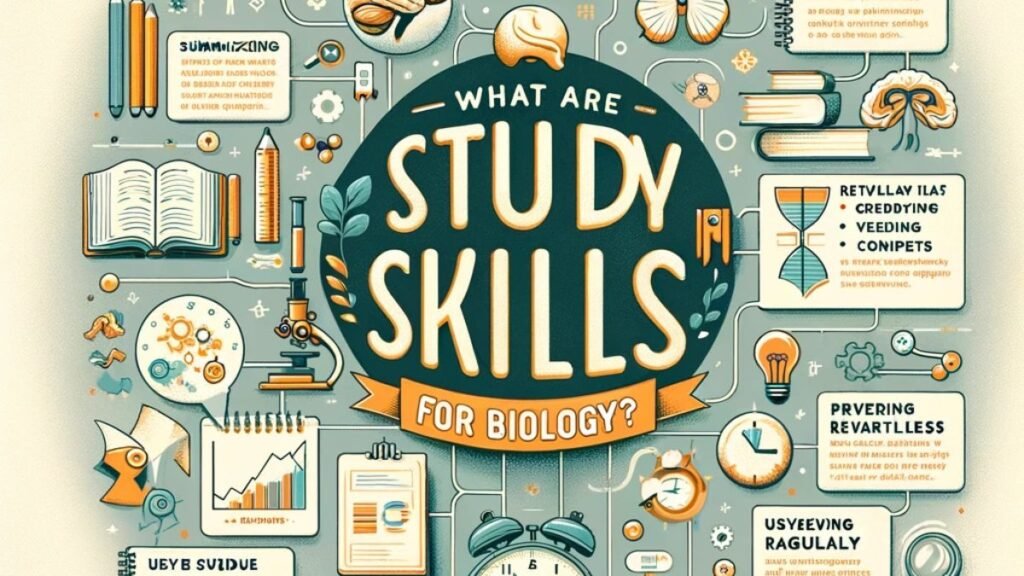Biology, the study of life, is a fascinating yet challenging subject. It requires students to understand complex concepts, memorize detailed information, and apply knowledge effectively. Mastering study skills for biology can make a significant difference in your academic success and deepen your appreciation for the subject. This guide will explore biology study skills, why they are crucial, and how to implement them for better results.
What Are Study Skills for Biology?
Study skills for biology refer to the techniques and strategies designed to help students grasp biological concepts, retain information, and excel in assessments. These skills include effective note-taking, organizing study materials, using visual aids, and practicing problem-solving.

Why Are Study Skills Important for Biology?
Biology is a subject that combines theory with practical application. Here’s why study skills are crucial:
- Comprehension of Complex Concepts: Many biological topics, such as genetics and molecular biology, require a deep understanding of intricate processes.
- Memorization of Key Details: From cell structures to the classification of organisms, biology demands retaining vast amounts of information.
- Practical Application: Study skills help you connect theoretical knowledge to real-life scenarios, such as understanding the impact of human activities on ecosystems.
How to Develop Effective Study Skills for Biology
1. Understand the Syllabus
Begin by thoroughly reviewing your syllabus. Understand the topics you must cover and prioritize areas where you feel less confident.
2. Master the Art of Note-Taking
- Use the Cornell Method to organize your notes effectively.
- Highlight key terms and definitions.
- Draw diagrams to visualize processes like photosynthesis or the human circulatory system.
3. Leverage Visual Learning Tools
Biology often involves understanding structures and processes. Use the following tools:
- Diagrams and Charts: Label cell diagrams or create flowcharts for metabolic pathways.
- Videos: Watch animated videos to understand complex processes.
- Flashcards: Use apps or physical cards to memorize terms and their definitions.
4. Adopt Active Learning Techniques
- Engage in group discussions to exchange ideas.
- Teach concepts to someone else; it’s one of the best ways to reinforce learning.
- Practice solving past papers or sample questions.
5. Make Use of Mnemonics
Memorize sequences or classifications using mnemonics. For instance, “Kingdom, Phylum, Class, Order, Family, Genus, Species” can be remembered as “King Philip Came Over For Good Soup.”
6. Relate Biology to Real Life
Connect biological concepts to everyday phenomena. For example, relate digestion topics to the food you eat or genetics to family traits.
7. Create a Study Schedule
Break your study time into smaller, focused intervals dedicated to a different subject or concept.
8. Utilize Technology
- Use biology apps like Quizlet or Anki for quizzes and flashcards.
- Access online platforms like Khan Academy for detailed explanations.
Additional Tips for Practical Exams
Biology includes lab work and practical assessments. Here’s how to prepare:
- Understand Lab Procedures: Familiarize yourself with common lab techniques, such as microscopy or dissection.
- Practice Observations: Learn to document observations accurately and concisely.
- Revise Experimental Results: Review past experiments and understand the significance of results.
Common Challenges in Studying Biology and How to Overcome Them
1. Information Overload
- Solution: Break down content into smaller chunks and focus on one topic at a time.
2. Difficulty in Understanding Processes
- Solution: Use videos and step-by-step guides to simplify complex processes.
3. Poor Retention
- Solution: Regularly revise and quiz yourself on previously learned material.
4. Time Management
- Solution: Plan your study sessions and stick to a timetable.
Key Takeaways
- Effective study skills are essential for mastering biology.
- Visual tools, note-taking, and active learning techniques enhance comprehension and retention.
- Regular revision and relating concepts to real life can make studying biology enjoyable and less overwhelming.
- Preparing for practical exams requires hands-on practice and a clear understanding of procedures.
FAQs
Q1: What is the best way to study for a biology test?
A: Focus on understanding key concepts, use flashcards for memorization, and practice with past papers to familiarize yourself with the test format.
Q2: How can I improve my retention in biology?
A: Regular revision, active recall techniques, and teaching concepts to others can significantly boost retention.
Q3: Are diagrams important in biology?
A: Yes, diagrams help visualize processes and structures, making it easier to understand and remember information.
Q4: How much time should I dedicate to studying biology daily?
A: It depends on your learning goals, but 1-2 hours of focused study daily is a good starting point.
Q5: Can online resources help in studying biology?
A: Absolutely! Platforms like Khan Academy, Coursera, and YouTube offer excellent tutorials and interactive learning tools.
Q6: How should I approach biology practical exams?
A: Prepare by practicing lab techniques, reviewing past experiments, and understanding the objectives of common biology practical.
Conclusion
Mastering study skills for biology requires dedication, practice, and the right strategies. By understanding your syllabus, adopting effective techniques, and using resources wisely, you can excel in biology and enjoy the learning process. Remember, biology is the study of life, and with the right approach, you can unlock its wonders effortlessly.
If you found these study skills helpful, leave a comment below and let us know your favorite tip! Don’t forget to share this with your friends who need help mastering Biology!